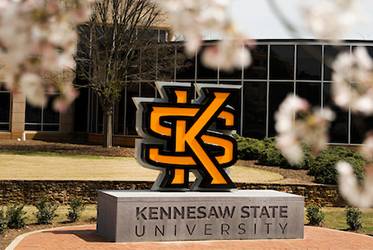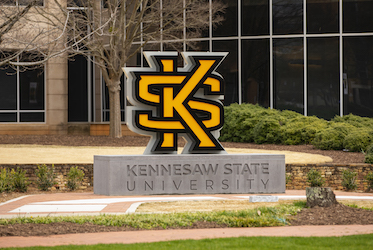
Hearty serving of learning
KENNESAW, Ga. | Apr 12, 2017
Pop-up restaurants are a sustainable success
Every semester, students in the Michael A. Leven School of Culinary Sustainability and Hospitality get a hearty helping of hands-on learning.
For their capstone project, seniors in the Culinary Sustainability and Hospitality program organize and host pop-up restaurants on the Kennesaw State University campus. The students work through the entire process of running a restaurant – developing their concept, determining the menu, testing recipes, ordering food, creating the decor, preparing the meals and hosting guests for lunch and dinner.
“They go from start to finish,” said Christian Hardigree, director of the Michael A. Leven School of Culinary Sustainability and Hospitality. “This is a high-impact practice where students can take the theoretical of the classroom and apply it in a real-world sense.”
The students put in several weeks of preparation prior to the start of the pop-up schedule. The 18 capstone students this semester are rotating through different roles for six pop-up restaurants, each with its own unique theme and menu.
“It blew me away how the team came together,” said Sonia Martinez, a senior from Alpharetta who was the lead manager for the second pop-up restaurant. “We had a lot of ideas, and it was difficult to see how we were going to put them together. The whole team came together and made it happen beautifully.”
That teamwork is the best aspect of the pop-ups, according to Stuart Slutzky, a lecturer of culinary sustainability and hospitality at KSU. Slutzky is in his first semester of overseeing the pop-up restaurants and has been impressed by the students’ collaboration and camaraderie.
“The students are so supportive of each other,” he said. “They know the significance of a capstone, so they approach it as, ‘I know how important it is for you. I’m going to give you my all.’ Then the students do the same for them when they become responsible for their own pop-up.”

Along with all the planning they put in, the students must address any unexpected challenges that arise during a pop-up lunch or dinner. Arturo Gutierrez, a senior from Johns Creek, realized while leading the semester’s first pop-up that a particular ingredient, uncooked corn meal, would not work properly for the Venezuelan-style arepas his team was preparing. So he dispatched two of his classmates to two different stores to bring back pre-cooked white corn meal, which did the trick.
“My big ‘a-ha moment’ is that you can never really be completely prepared,” Gutierrez said. “I like to think that is how it is in the real world. You have to make sure that you’re ready and that you have a good team that will be able to handle a situation if they need to.”
Gutierrez was the lead manager for Platos de Sur, a South American-themed pop-up of authentic cuisine from Brazil, Peru, Ecuador, Argentina, Chile and Venezuela. Martinez led a pop-up titled Juniper, which she described as “evoking the Southeastern wilderness featuring seasonal, native ingredients and heritage protein reflected in a modern atmosphere.”
The varied pop-ups this semester also include Espléndido!, offering authentic Spanish cuisine; the Quintessential Pop-Up, pairing seasonal beer with a local variety of small-plate options, artisanal cheeses and puff pastries; and Mystery Grille, which involves guests in a mystery game similar to “Clue” throughout each course. Along the way, the students gain experience that will benefit them whether they remain in the culinary field or pursue a different career, according to Hardigree.
“The students are so proud of what they’ve accomplished and what they’ve designed, but they’re also getting skills that translate into whatever career pathway they end up in,” she said. “It is empowering for the students and it’s exciting for us as instructors. It provides proud moments for all of us.”

Fittingly for the Culinary Sustainability and Hospitality program, part of each student’s grade is based on the efficiency of their pop-up restaurant, such as how much water is used and how much food goes to waste. Also, compost from each pop-up is taken to Kennesaw State’s Hickory Grove Farm and used as fertilizer.
“We’re a program that integrates sustainability,” Hardigree said, “so they’re evaluated not only on putting on this restaurant concept, but were they able to do it efficiently and what would be their theoretical profit?”
The Leven School of Culinary Sustainability and Hospitality will host three more pop-up restaurants this semester, on April 14, 21 and 28. For more information, click here.
– Paul Floeckher
Photos by David Caselli; Video by Marc Francis
Related Stories
A leader in innovative teaching and learning, Kennesaw State University offers undergraduate, graduate, and doctoral degrees to its more than 47,000 students. Kennesaw State is a member of the University System of Georgia with 11 academic colleges. The university’s vibrant campus culture, diverse population, strong global ties, and entrepreneurial spirit draw students from throughout the country and the world. Kennesaw State is a Carnegie-designated doctoral research institution (R2), placing it among an elite group of only 8 percent of U.S. colleges and universities with an R1 or R2 status. For more information, visit kennesaw.edu.


















